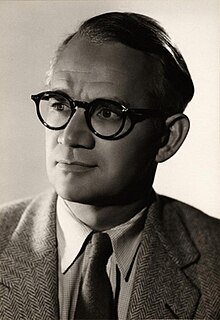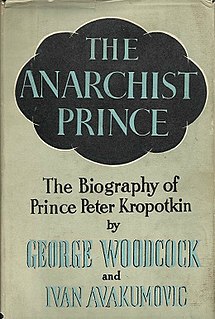Anarchism is a political philosophy and movement that calls for the abolition of the state.
Anarchism may also refer to:
Individualist anarchism is the branch of anarchism that emphasizes the individual and their will over external determinants such as groups, society, traditions and ideological systems. Although usually contrasted to social anarchism, both individualist and social anarchism have influenced each other. Mutualism, an economic theory particularly influential within individualist anarchism whose pursued liberty has been called the synthesis of communism and property, has been considered sometimes part of individualist anarchism and other times part of social anarchism. Many anarcho-communists regard themselves as radical individualists, seeing anarcho-communism as the best social system for the realization of individual freedom. Economically, while European individualist anarchists are pluralists who advocate anarchism without adjectives and synthesis anarchism, ranging from anarcho-communist to mutualist economic types, most American Individualist Anarchists advocate mutualism, a libertarian socialist form of market socialism, or a free-market socialist form of classical economics. Individualist anarchists are opposed to property that gives privilege and is exploitative, seeking to "destroy the tyranny of capital, — that is, of property" by mutual credit.
Individualism is the moral stance, political philosophy, ideology and social outlook that emphasizes the intrinsic worth of the individual. Individualists promote the exercise of one's goals and desires and to value independence and self-reliance and advocate that interests of the individual should achieve precedence over the state or a social group while opposing external interference upon one's own interests by society or institutions such as the government. Individualism is often defined in contrast to totalitarianism, collectivism and more corporate social forms.
Libertarian socialism, also referred to as anarcho-socialism, anarchist socialism, free socialism, stateless socialism, socialist anarchism and socialist libertarianism, is an anti-authoritarian, anti-statist and libertarian political philosophy within the socialist movement which rejects the state socialist conception of socialism as a statist form where the state retains centralized control of the economy. Overlapping with anarchism and libertarianism, libertarian socialists criticize wage slavery relationships within the workplace, emphasizing workers' self-management and decentralized structures of political organization. As a broad socialist tradition and movement, libertarian socialism includes anarchist, Marxist and anarchist or Marxist-inspired thought as well as other left-libertarian tendencies. Anarchism and libertarian Marxism are the main currents of libertarian socialism.

George Woodcock was a Canadian writer of political biography and history, an anarchist thinker, a philosopher, an essayist and literary critic. He was also a poet and published several volumes of travel writing. In 1959 he was the founding editor of the journal Canadian Literature which was the first academic journal specifically dedicated to Canadian writing. He is most commonly known outside Canada for his book Anarchism: A History of Libertarian Ideas and Movements (1962).
Anarcho-pacifism, also referred to as anarchist pacifism and pacifist anarchism, is an anarchist school of thought that advocates for the use of peaceful, non-violent forms of resistance in the struggle for social change. Anarcho-pacifism rejects the principle of violence which is seen as a form of power and therefore as contradictory to key anarchist ideals such as the rejection of hierarchy and dominance. Many anarcho-pacifists are also Christian anarchists, who reject war and the use of violence.

Christian anarchism is a Christian movement in political theology that claims anarchism is inherent in Christianity and the Gospels. It is grounded in the belief that there is only one source of authority to which Christians are ultimately answerable—the authority of God as embodied in the teachings of Jesus. It therefore rejects the idea that human governments have ultimate authority over human societies. Christian anarchists denounce the state, believing it is violent, deceitful and, when glorified, idolatrous.

Free-market anarchism, or market anarchism, also known as free-market anti-capitalism and free-market socialism, is the branch of anarchism that advocates a free-market economic system based on voluntary interactions without the involvement of the state. A form of individualist anarchism, and market socialism, it is based on the economic theories of mutualism and individualist anarchism in the United States.
Anarchists have employed certain symbols for their cause, including most prominently the circle-A and the black flag.
The history of anarchism is as ambiguous as anarchism itself. Scholars find it hard to define or agree on what anarchism means, which makes outlining its history difficult. There is a range of views on anarchism and its history. Some feel anarchism is a distinct, well-defined 19th and 20th century movement while others identify anarchist traits long before first civilisations existed.
Lawlessness is a lack of law, in any of the various senses of that word. Lawlessness may describe various conditions.
Individualist anarchism in the United States was strongly influenced by Benjamin Tucker, Josiah Warren, Ralph Waldo Emerson, Lysander Spooner, Pierre-Joseph Proudhon, Max Stirner, Herbert Spencer and Henry David Thoreau. Other important individualist anarchists in the United States were Stephen Pearl Andrews, William Batchelder Greene, Ezra Heywood, M. E. Lazarus, John Beverley Robinson, James L. Walker, Joseph Labadie, Steven Byington and Laurance Labadie.
Libertarian anarchism may refer to:
Anarcho-Syndicalism: Theory and Practice. An Introduction to a Subject Which the Spanish War Has Brought into Overwhelming Prominence is a book written by the German anarchist Rudolf Rocker. Its first edition was published in English by Secker and Warburg, London in 1938, after having been translated by Ray E. Chase from Rocker's original German. Rocker penned this political and philosophical work in 1937, at the behest of Emma Goldman, as an introduction to the ideals fueling the Spanish social revolution and resistance to capitalism and fascism the world over. Within, Rocker offers an introduction to anarchist ideas, a history of the international workers' movement, and an outline of the syndicalist strategies and tactics embraced at the time. The Pluto Press and the newest AK Press editions including a lengthy introduction by Nicolas Walter and a preface by Noam Chomsky. An abridged version was published in the 1950s as Anarchism and Anarcho-Syndicalism.
Anarchy is a society being freely constituted without authorities or a governing body. It may also refer to a society or group of people that entirely rejects a set hierarchy. Anarchy was first used in English in 1539, meaning "an absence of government". Pierre-Joseph Proudhon adopted anarchy and anarchist in his 1840 treatise What Is Property? to refer to anarchism, a new political philosophy and social movement which advocates stateless societies based on free and voluntary associations. Anarchists seek a system based on the abolition of all coercive hierarchy, in particular the state, and many advocate for the creation of a system of direct democracy and worker cooperatives.

Pierre-Joseph Proudhon was a French socialist, politician, philosopher, economist and the founder of mutualist philosophy. He was the first person to declare himself an anarchist, using that term, and is widely regarded as one of anarchism's most influential theorists. Proudhon is considered by many to be the "father of anarchism". Proudhon became a member of the French Parliament after the Revolution of 1848, whereafter he referred to himself as a federalist. Proudhon described the liberty he pursued as "the synthesis of communism and property". Some consider his mutualism to be part of individualist anarchism while others regard it to be part of social anarchism.
Anarchism is the political philosophy which holds ruling classes and the state to be undesirable, unnecessary and harmful, or alternatively as opposing authority and hierarchical organization in the conduct of human relations.

The Anarchist Prince is a biography of Peter Kropotkin by George Woodcock and Ivan Avakumović.

Anarchism is book-length study of anarchism written by Paul Eltzbacher. It was originally published in 1900 and quickly translated into five languages, including English in 1908 by Steven T. Byington.
Anarchism and libertarianism, as broad political ideologies with manifold historical and contemporary meanings, have contested definitions. Their adherents have a pluralistic and overlapping tradition that makes precise definition of the political ideology difficult or impossible, compounded by a lack of common features, differing priorities of subgroups, lack of academic acceptance, and contentious, historical usage.